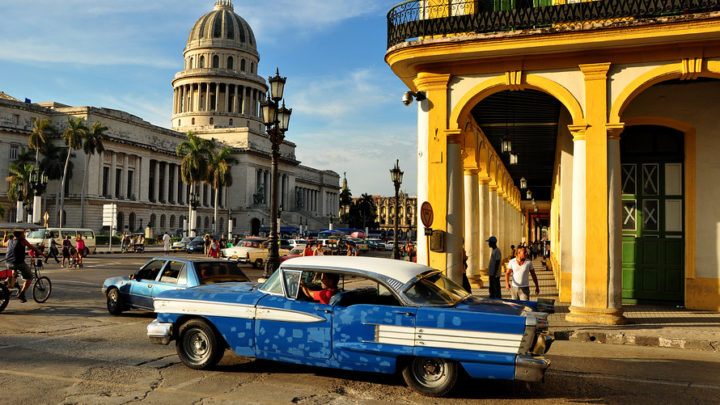
U.S. travel association opposes Trump administration’s Cuba travel warning and pullout of embassy staff
Meeting in Cuba, RESPECT*, the largest association of U.S. organizers of travel to Cuba, unanimously rejected the Trump administration’s Cuba travel warning and its decision to withdraw diplomatic staff from its Havana embassy.
The reaction came in response to Washington’s announcement that it is withdrawing 60 percent of non-emergency staff from the U.S. Embassy in Havana and is warning U.S. citizens to avoid travel to Cuba. The justification for both is unexplained health problems that 21 Havana-based U.S. diplomats have reported.
In addition, unidentified U.S. officials said the Consulate in Havana would suspend issuing U.S. visas to Cubans, indefinitely. The U.S. Embassy will continue to provide emergency services to U.S. citizens in Cuba.
“Based on the evidence thus far and the fact that the State Department says no other U.S. citizens have been affected, we believe that its decision is unwarranted, and are continuing to organize travel to Cuba and encourage others to do so,” said Bob Guild, RESPECT Co-Coordinator and Vice President of Marazul Charters. He also stressed that U.S. citizens and residents can legally travel to Cuba under US law and that the State Department advisory in no way prohibits U.S. persons from traveling to the island.
RESPECT is joined by U.S. commercial airlines and others in the travel industry who have publically expressed their intention to continue Cuba travel. Gail Reed, RESPECT Co-Coordinator and MEDICC founder, noted: “Cuba remains a very safe destination for U.S. travelers.”
The U.S. Foreign Service Association, the powerful union that represents U.S. diplomats around the world, also opposes any decision to withdraw U.S. diplomats from Cuba. Association President Barbara Stephenson said, “We have to remain on the field and in the game.”
The U.S. complaint about the health issues originated almost a year ago during the Obama Administration when the two governments were working toward rapprochement. As acknowledged by U.S. Secretary of State Rex Tillerson, the Cuban government responded immediately and initiated an investigation, inviting the U.S. government to cooperate.
At the invitation of Cuban authorities, the FBI went to Havana seeking evidence of what the U.S. described as “sonic attacks” resulting in hearing loss and other symptoms. However, its agents found no devices or other evidence to explain the mystery.
None of the 500,000 U.S. visitors to Cuba this year have reported similar health issues. Tillerson said this week, “We have no reports that private U.S. citizens have been affected…”.
Foreign Minister Bruno Rodriguez, speaking at the UN this month, reiterated that Cuba takes very seriously the protection of all diplomats in its country and would never cause them harm or allow others to do so, in accordance with the 1961 Vienna Convention. He also urged the U.S. authorities to work more closely and effectively with the ongoing Cuban investigation, a point he raised again during his meeting with Tillerson this week.
Replying to the U.S. move to reduce its diplomatic personnel in Havana, Josefina Vidal, director general for U.S. Affairs at Cuba’s Foreign Ministry, called the decision precipitous and said it will affect bilateral relations and cooperation in areas of mutual interest. She noted that Cuba had urged the U.S. not to politicize the matter and insisted that Cuba needed the active cooperation of U.S. authorities to arrive at a definitive conclusion.
“We fear that such hasty action by the Trump Administration, independent of scientific evidence, may be motivated by politics rather than concerns for health and wellbeing,” said Walter Turner, RESPECT Co-Coordinator and President of Global Exchange. “Thus, once again we encourage all U.S. visitors to continue to travel to Cuba.”
![]()
* RESPECT (Responsible Ethical Cuba Travel) is a 150-member US professional association of non-profit entities, travel agencies, tour operators and other travel service providers dedicated to practicing and promoting ethical and socially responsible travel to Cuba. Founded in December 2016 on the anniversary of the opening announced by the US and Cuban presidents, RESPECT held a two-day meeting at the Meliá Cohíba Hotel in Havana this week, where its members hammered out a 2017 Action Plan to implement its 17 principles. These include ways US travel organizations and travelers can contribute to protecting Cuba’s environment as it adapts to climate change, commit to non-exploitative relations with all Cubans and respect the country’s cultural heritage and expressions. The Association also defends the right of all US citizens and residents to travel to Cuba and advocates lifting all US government travel restrictions to the island.

